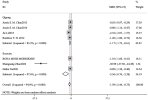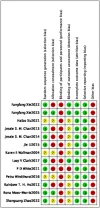Effectiveness and safety of exercise therapy in patients with myalgic encephalomyelitis/chronic fatigue syndrome (ME/CFS): A meta-analysis
Zhenya Wei, Heying Wu, Chong Cui, Zixu Wang, Huazhong Xiong, Fujia Song, Jixiang Ren
[Line breaks added]
Purpose
To promote the development of new therapies, we conduct a systematic review to evaluate the effectiveness and safety of exercise therapy for myalgic encephalomyelitis/chronic fatigue syndrome (ME/CFS).
Methods
PubMed, Web of Science, Embase, and Cochrane were searched for exercise therapy studies on ME/CFS up to March 2024. The literature was updated on June 7, 2025. The meta-analysis was performed using Stata 17.0 and RevMan 5.4.
Results
A total of 13 studies with 1,305 patients were analyzed.
Exercise therapy improved overall scores on fatigue scale-14 (FS-14) (MD=-0.48, 95% CI [-0.77, -0.19], p<0.001) and reduced total fatigue score (MD=-1.59, 95% CI [-2.44, -0.75], p<0.001). With multidimensional fatigue inventory (MFI-20), it showed a non-significant reduction in general fatigue (MD=-0.23, 95% CI [-0.55, 0.10], p=0.168).
Subgroup analysis showed that conventional exercise therapy mainly based on aerobic exercise was more effective in reducing total fatigue score (MD=-5.56, 95% CI [-8.74, -2.38], p=0.001) than Qigong (MD=-0.09, 95% CI [-0.41, 0.23], p<0.001). However, Qigong was more effective in reducing mental fatigue (MD=-0.82, 95% CI [-1.38, -0.26], p=0.004) compared with conventional exercise (MD=-3.40, 95% CI [-5.59, -1.21], p=0.002).
Conclusion
Evidence indicates that exercise therapy alleviates fatigue in ME/CFS patients, with varying effects across intervention types. Conventional aerobic exercise appears more effective for reducing overall fatigue than Qigong. However, Qigong shows greater benefits for reducing mental fatigue.
Given the current limitations, the safety of exercise therapy requires further evaluation, and additional high-quality RCTs are warranted to validate these findings.
Web | Frontiers in Neurology | Abstract only ahead of publication
Zhenya Wei, Heying Wu, Chong Cui, Zixu Wang, Huazhong Xiong, Fujia Song, Jixiang Ren
[Line breaks added]
Purpose
To promote the development of new therapies, we conduct a systematic review to evaluate the effectiveness and safety of exercise therapy for myalgic encephalomyelitis/chronic fatigue syndrome (ME/CFS).
Methods
PubMed, Web of Science, Embase, and Cochrane were searched for exercise therapy studies on ME/CFS up to March 2024. The literature was updated on June 7, 2025. The meta-analysis was performed using Stata 17.0 and RevMan 5.4.
Results
A total of 13 studies with 1,305 patients were analyzed.
Exercise therapy improved overall scores on fatigue scale-14 (FS-14) (MD=-0.48, 95% CI [-0.77, -0.19], p<0.001) and reduced total fatigue score (MD=-1.59, 95% CI [-2.44, -0.75], p<0.001). With multidimensional fatigue inventory (MFI-20), it showed a non-significant reduction in general fatigue (MD=-0.23, 95% CI [-0.55, 0.10], p=0.168).
Subgroup analysis showed that conventional exercise therapy mainly based on aerobic exercise was more effective in reducing total fatigue score (MD=-5.56, 95% CI [-8.74, -2.38], p=0.001) than Qigong (MD=-0.09, 95% CI [-0.41, 0.23], p<0.001). However, Qigong was more effective in reducing mental fatigue (MD=-0.82, 95% CI [-1.38, -0.26], p=0.004) compared with conventional exercise (MD=-3.40, 95% CI [-5.59, -1.21], p=0.002).
Conclusion
Evidence indicates that exercise therapy alleviates fatigue in ME/CFS patients, with varying effects across intervention types. Conventional aerobic exercise appears more effective for reducing overall fatigue than Qigong. However, Qigong shows greater benefits for reducing mental fatigue.
Given the current limitations, the safety of exercise therapy requires further evaluation, and additional high-quality RCTs are warranted to validate these findings.
Web | Frontiers in Neurology | Abstract only ahead of publication


